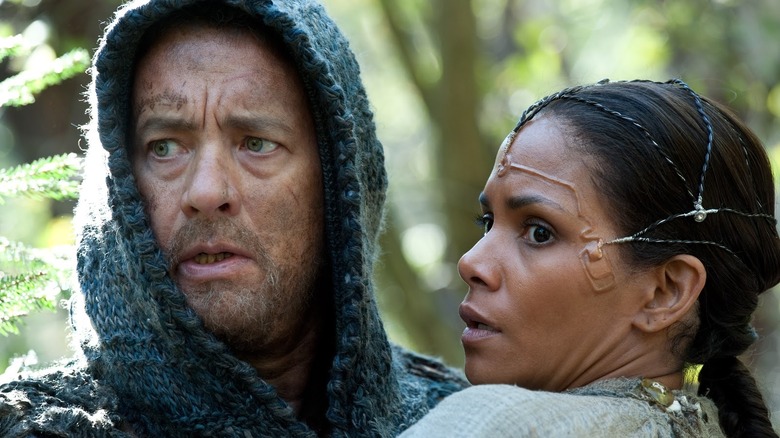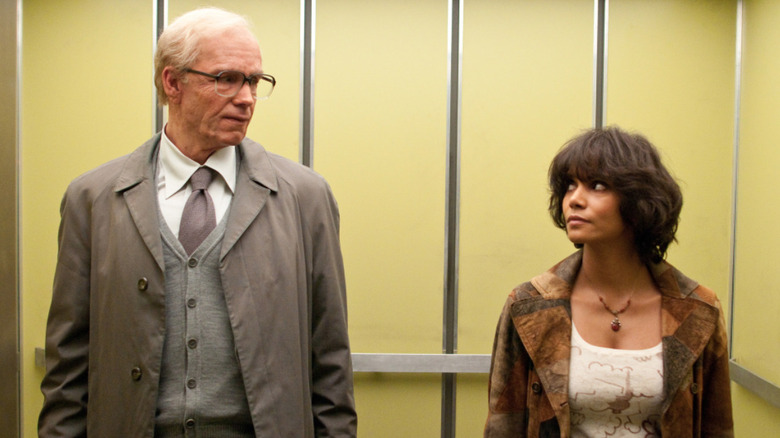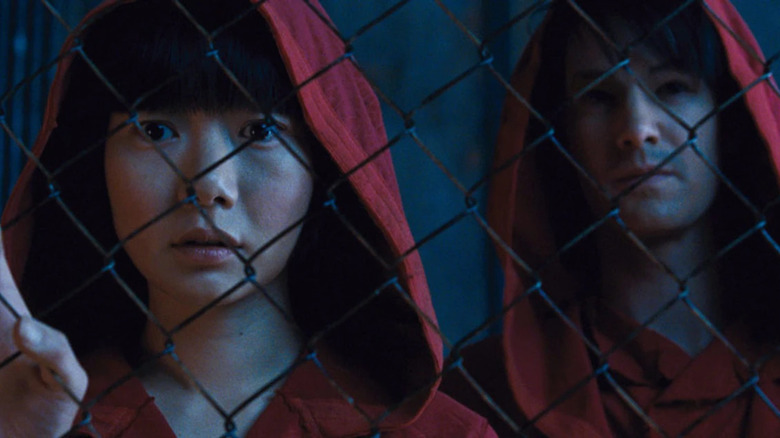Cloud Atlas Was One Of Tom Hanks' Biggest Flops, But You Shouldn't Sleep On It
Tom Hanks is a beloved national treasure, an acclaimed Oscar winner, and an A-lister with many box office hits to his name, having lent his acting talents to high-grossing films as varied as "Toy Story," "The Da Vinci Code," and "Forrest Gump." But Hanks is also not impervious to ambitious failures. In 2012, he starred in one of the most expensive independent movies of all time — a film that would go on to become one of the actor's biggest flops, too.
That movie is "Cloud Atlas," a deeply misunderstood film at the time of its release and also one of the Wachowskis' masterpieces. (All their movies are great, but this is one of the best ones.) Without "Cloud Atlas," we probably wouldn't have gotten "Sense8" or "The Matrix Resurrections" ... although we may still have gotten "Jupiter Ascending" regardless.
It is easy to see why audiences didn't immediately connect with "Cloud Atlas." Despite a huge ensemble cast of beloved actors like Halle Berry, Hugo Weaving, Jim Broadbent, Keith David, James D'Arcy, Susan Sarandon, and Hugh Grant, in addition to Hanks, the film's nonlinear story (make that stories) spanning almost 500 years of history has given rise in many an explainer chart and YouTube video trying to unravel what the hell the movie is even about.
However, to dismiss "Cloud Atlas" as an incomprehensible mess is to miss out on a touching, thrilling, poignant, meaningful, and otherwise truly epic work of science fiction.
The true true
An adaptation of David Mitchell's 2004 novel of the same name, "Cloud Atlas" follows six different storylines across six very different eras in human history covering some five centuries. Each of these stories is interconnected in one way or another, with the main cast performing multiple roles.
Here's where things start (?) to get a little confusing. These stories are told non-linearly, with the film constantly jumping back and forth between them. Meanwhile, many of the film's actors play characters of varying races and gender, with the implication being that we're seeing the same set of souls reincarnated as different people throughout history. At one point, most of the cast is even in yellowface makeup as part of a story set in the dystopian futuristic city of Neo Seoul. Naturally, this creative choice proved to be highly controversial at the time of the film's initial release.
Let me be clear: the use of yellowface is bad and should always be criticized. However, if you're willing to give the film the benefit of the doubt, it could definitely be argued that the Wachowskis had their heart in the right place. The film's very thesis is that souls and relationships carry on. To quote "Avatar: The Last Airbender," "Friendships can last more than one lifetime."
"Cloud Atlas" is perhaps the Wachowskis' most emotional movie outside of "V for Vendetta" (which, just to clarify, they wrote but did not direct). If "The Matrix" was a deeply philosophical film wrapped up inside a very badass kung fu movie, then "Cloud Atlas" takes away all the subtext and says the quiet part out loud. Seeing these souls' fates across time, with some of them becoming better people and those inclined to do unspeakable things only getting worse, is a delight to see.
Love persevering
To put it plainly, "Cloud Atlas" takes the concept of an epic quite literally by going back to the basics of Greek mythology, weaving a long and grandiose story spanning centuries and lifetimes. The fun and emotion of the movie comes from seeing how even the smallest and otherwise insignificant act of bravery or kindness can reshape the world. We see how a journal from a former abolitionist inspires a composer to make a highly influential work of art centuries later. Elsewhere, an aging publisher in the film's present-day write a script that eventually inspires a human clone to start a revolution centuries down the line (which, in turn, leads to her being worshipped like a god in the post-apocalypse).
The Wachowskis weave each emotional thread seamlessly, creating a web of cause and effect that doesn't require multiple viewings to understand, but asks you to get on its wavelength or else try again until you do. Not everything works, but the film nevertheless succeeds wonderfully as a deeply earnest and emotional experience. And that really is the true true.


